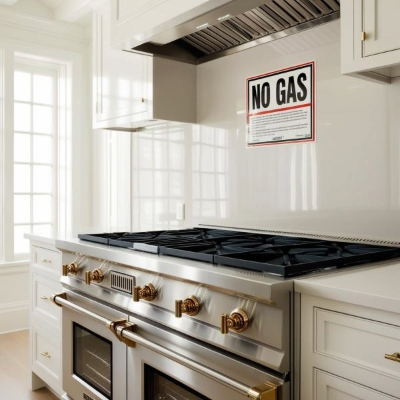When it comes to kitchen appliances, few are as iconic and widely known as gas ranges and cooktops. Renowned for their instant heat and impeccable temperature control, they have long been the preferred choice for home chefs and culinary enthusiasts alike. However, what many might overlook are the serious health risks and dangers associated with these seemingly harmless appliances. While they can enhance our cooking experience, gas ranges can also contribute to serious health issues and potential disasters in the home.
Gas ranges and gas cooktops are one of the worst appliances you can buy for you and your family. I removed our gas range out of my home years ago as it was causing several family members upper respiratory health issues. Those issues disappeared within a short period of time after removing it and replacing it with a high quality electric induction range. Once you get use to cooking with electric induction it is truly a superior technology. I would strongly recommend that anyone looking to build a new home does not install a gas range or cooktop, especially in as tightly built home, for the following reasons:
Health Risks: Indoor Air Quality and Asthma
One of the lesser-known but critical dangers of gas ranges is their role in deteriorating indoor air quality. When burned, natural gas (methane) produces byproducts such as nitrogen dioxide (NO2), which is a significant contributor to air pollution. According to the U.S. Environmental Protection Agency (EPA), exposure to NO2 can lead to severe health impacts, particularly for vulnerable populations such as children, the elderly, and individuals with pre-existing respiratory conditions.
Nitrogen Dioxide and Respiratory Illnesses
Numerous studies have established a clear link between nitrogen dioxide exposure and respiratory illnesses, including asthma. Even short-term peaks of NO2 exposure can exacerbate asthma symptoms and lead to hospitals admitting children with asthma. While household gas ranges may represent just one source of NO2, the accumulation of indoor pollutants can turn your kitchen into a hazardous space. Children, whose respiratory systems are still developing, are at the highest risk, potentially leading to long-term health complications.
Symptoms of Exposure
Prolonged exposure to nitrogen dioxide can manifest in various symptoms, such as:
- Coughing
- Wheezing or shortness of breath
- Increased susceptibility to respiratory infections
- Aggravated asthma or allergies
- Decreased lung function
With these risks lurking unnoticed in households featuring gas ranges, it is essential for homeowners to consider the implications before committing to their use.
The Danger of Gas Leaks and Explosions
Aside from health implications, gas ranges also pose a physical danger due to the risks of gas leaks and explosions. Gas, particularly natural gas, is highly combustible. An unnoticed gas leak can lead to escalating gas buildup in the home, which can result in an explosion at any moment. According to a report from the National Fire Protection Association, gas appliance-related fires and explosions have caused deaths and numerous injuries.
Preventative Measures
To mitigate the risk of explosions, individuals who use gas appliances should implement various safety measures, including:
- Regular Maintenance: Schedule annual inspections of gas appliances and associated piping to detect potential leaks.
- Proper Ventilation: Utilize exhaust hoods and open windows while cooking to disperse any dangerous gases that may accumulate.
- Leak Detection Systems: Install gas leak detectors to provide alerts in the event of dangerous gas accumulation.
- Educate Household Members: Ensure all residents of the home understand the signs of a gas leak, including the distinct rotten egg smell, and know how to act in emergencies.
Carbon Monoxide: An Invisible Threat
In addition to nitrogen dioxide, burning gas appliances can produce carbon monoxide (CO)—a colorless, odorless gas that is extremely toxic. Low-level CO exposure can cause headaches and fatigue, while high-level exposure can result in unconsciousness or death. Households should invest in CO detectors as an additional safety measure, effectively integrating early detection systems into their home safety protocols.
Is a Gas Range Worth the Risk?
While consumers often choose gas ranges for their cooking advantages, it is crucial to weigh the associated risks. Ventilation, proper maintenance, and awareness of the signs of gas leaks are necessary components to mitigate these dangers. However, it may also be worth considering electric or induction cooktops as alternative heating sources. Unlike gas ranges, these options do not emit air pollutants or pose explosion risks, often leading to improved indoor air quality overall.
Restaurants and chefs all over the country are switching to electric induction cooking for the numerous cooking benefits and no emissions. It is no longer true that gas is the superior cooking technology, electric induction has long since surpassed gas but it is taking some time for people to see this.
Are Gas Ranges Worth It?
In recent years, the conversation surrounding healthy cooking environments has gained traction, prompting consumers to think critically about their kitchen choices. While gas ranges and cooktops deliver a descent cooking performance in the kitchen, the potential health and safety risks they present are significant. From respiratory illnesses linked to nitrogen dioxide to the threat of gas leaks and carbon monoxide, it’s essential to approach the decision to install a gas range with caution. Every homeowner should weigh the convenience and performance of their appliances and consider moving towards safer, cleaner cooking alternatives like electric induction for themselves and their families.
 Article Written By Ryan Adams, President of Built By Adams, Inc
Article Written By Ryan Adams, President of Built By Adams, Inc




